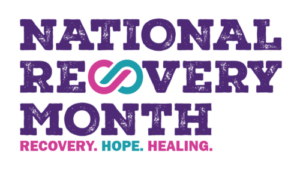September Is National Recovery Month
According to the most recent National Survey of Drug Use and Health (NSDUH) approximately 17% of Americans 12 years old or older qualified as having a substance use disorder in the past year. Despite the fact that most people are close to someone with an addiction, this disease is still highly stigmatized and misunderstood.
National Recovery Month offers an opportunity for both people with addictions and their loved ones to learn more about this deadly disease, as well as treatment and recovery support.
What Is National Recovery Month?
 In the United States, National Recovery Month is observed in September. While in the past, each year focused on a new theme, the permanent, overarching theme going forward is “Every Person. Every Family. Every Community.” The goal is to raise understanding of the disease of addiction, reduce stigma attached to the condition, and educate the public on prevention, recovery, and support. The 4 weeks of September correspond and highlight each of the 4 dimensions of recovery, each with a key message. In order, these are:
In the United States, National Recovery Month is observed in September. While in the past, each year focused on a new theme, the permanent, overarching theme going forward is “Every Person. Every Family. Every Community.” The goal is to raise understanding of the disease of addiction, reduce stigma attached to the condition, and educate the public on prevention, recovery, and support. The 4 weeks of September correspond and highlight each of the 4 dimensions of recovery, each with a key message. In order, these are:
- Health. “We can strive to be healthier and achieve our wellness goals.” Recovery is possible; so is overcoming current mental health conditions. It’s important to make healthy choices in recovery and to reach out for help when needed.
- Home. “We all need a stable and safe place to call home.” A safe and stable home serves as the foundation for sobriety, which is why access to affordable, safe housing is vital for people in recovery from addiction and mental health issues.
- Purpose. “Finding purpose in life may be a powerful driver for recovery.” Meaningful daily activities, spirituality, employment, volunteering, or creative pursuits can all contribute heavily to one’s continued sobriety.
- Community. “Building social support and a caring community is essential for recovery.” Meaningful connection with others—whether family, friends, peers, or anyone who accepts us—can give us strength and help us grow.
The Importance of National Recovery Month
One of the most devastating things about addiction is that the disease doesn’t just harm the person with the addiction but also the people they care about.
This is why everyone can benefit from more awareness and understanding, and it’s why National Recovery Month is so crucial. Each year, the observance of National Recovery Month aims to promote and support new evidence-based treatment and recovery approaches and to celebrate people in recovery, treatment service providers, and community members supporting their neighbors and loved ones.
Education on Addiction & Recovery
Despite how common addiction is, and how destructive it can be, it is still widely misunderstood. Even people with good intentions may perpetuate harmful myths, enable their loved ones to continue their deadly behaviors, or spread misinformation.
National Recovery Month is a great opportunity to educate yourself and others on addiction, treatment, and recovery. Here are some of the basics.
Addiction is a mental health condition characterized by uncontrollable compulsions to drink or use drugs despite clinically significant impairment in someone’s life. People with addictions often need treatment to enter recovery and, even then, it may take several attempts before someone achieves lasting sobriety.
Effective, research-based treatment strategies include:
- Behavioral therapy. The most common form of therapy used in addiction treatment is cognitive-behavioral therapy (CBT), which teaches patients to modify behavioral and thought patterns, identify stress triggers, and use positive coping mechanisms. Other forms of addiction therapy include motivational interviewing, contingency management, family behavior therapy, and more.
- Medications for substance use disorder. When used alongside therapy, medications are a valuable treatment tool, mitigating withdrawal symptoms and cravings, and allowing patients to focus on their recovery and daily routine.
- Integrated treatment for co-occurring disorders. Research shows that simultaneous treatment, as opposed to treating one condition after another, consistently yields better outcomes.
- Peer support. 12-Step programs, SMART Recovery, and other peer support programs can provide a sober network, which is invaluable to recovery.
Reducing Stigma Around Addiction & Treatment
 Stigma and shame around addiction is one of the most common barriers between people and addiction treatment. Myths like “being addicted to drugs is a choice,” or “addicts lack the willpower to get sober” are often repeated like facts. These myths are harmful because they can prevent people from helping people they care about and can shame people with addictions from admitting they have a problem and getting the help they need.
Stigma and shame around addiction is one of the most common barriers between people and addiction treatment. Myths like “being addicted to drugs is a choice,” or “addicts lack the willpower to get sober” are often repeated like facts. These myths are harmful because they can prevent people from helping people they care about and can shame people with addictions from admitting they have a problem and getting the help they need.
Reducing stigma is not meant to provide excuses for people with addictions to continue using substances; preventing someone from experiencing the negative consequences of addiction is called enabling and can be just as harmful. However, viewing addiction as something one should be ashamed of or people with addictions as incapable of recovery prevents people who want to make a change from seeking help or confiding in people they should be able to rely on.
A simple way to reduce stigma surrounding addiction is by altering the language we use. For example, consider using person-first language: Rather than referring to someone as an “addict,” say “person with addiction.” The latter reinforces the fact that this person is not solely defined by their disease.
Additionally, sharing personal stories about recovery and being willing to listen without passing can show people in active addiction that they are not alone, that they should be ashamed about needing help, and that they too can live a sober life.
Ways You Can Get Involved During National Recovery Month
There are several ways to observe National Recovery Month. This may include attending events, volunteering, social media activism, or just having conversations with peers or people in your community.
Community Events
Many cities or counties will host events such as walks, rallies, or seminars for National Recovery Month. Your county government website may have a calendar with some of these events. In addition, the Substance Abuse and Mental Health Services Administration (SAMHSA) has several online events listed on their website.
Workshops and Training
National Recovery Month is the perfect time to get educated on addiction, treatment, and overdose response.
For example, anyone that uses drugs or is near someone that may use them can benefit from Narcan (naloxone) training. Narcan is a nasal spray device that delivers a dose of a lifesaving opioid antagonist that can reverse an overdose and buy time for emergency services to arrive. It is legal to carry in all states without a prescription. There are many free workshops or training programs available to help you recognize the signs of opioid overdose, respond quickly, and save someone’s life. Many training videos are also available online.
Social Media Campaigns
Social media is a useful tool for getting the word out about National Recovery Month. In addition, speaking publicly about addiction and recovery can reduce stigma and encourage others to get help.
If you have personal experience with addiction and recovery and are comfortable sharing it with the world, consider doing so. Stories of recovery are inspiring and can highlight the exceptional work of healthcare workers, organizations, and community members.
Promoting Treatment and Recovery
 The observance of National Recovery Month aims to underscore the path to recovery. For many, this involves evidence-based addiction treatment. If you or a loved one are ready to start on or resume this path, call to speak with a compassionate admissions navigator. They can answer questions about treatment, verify your insurance coverage, and help you begin the admissions process at an American Addiction Centers (AAC) facility near you.
The observance of National Recovery Month aims to underscore the path to recovery. For many, this involves evidence-based addiction treatment. If you or a loved one are ready to start on or resume this path, call to speak with a compassionate admissions navigator. They can answer questions about treatment, verify your insurance coverage, and help you begin the admissions process at an American Addiction Centers (AAC) facility near you.
